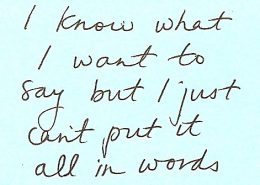 https://socialanxietyireland.com/wp-content/uploads/2018/09/I-know-what-i-want-to-say-but.jpg
577
471
Odhran
https://socialanxietyireland.com/wp-content/uploads/2018/03/sai.png
Odhran2018-09-25 15:57:552018-10-05 20:36:00What I Want To Say.
https://socialanxietyireland.com/wp-content/uploads/2018/09/I-know-what-i-want-to-say-but.jpg
577
471
Odhran
https://socialanxietyireland.com/wp-content/uploads/2018/03/sai.png
Odhran2018-09-25 15:57:552018-10-05 20:36:00What I Want To Say.affecting approximately 13.7% of Irish adults at any one point in time.
Menu: Social Anxiety
Behavioral & Emotional Symptoms:
- Anxiety reaches such a point that daily tasks, school, work and activities become affected
- Avoiding situations where the sufferer feels he/she may be the center of attention
- Kids with possible SA tend to be worried about being embarrassed in front of peers
- Considerable fear of being in situations with strangers (people the sufferer does not know)
- Dread over how they will be presented to others
- Excessive fear of being teased or criticized
- Excessive fear that other people may notice that the sufferer looks anxious
- Excessive worry about being anxious, which makes the anxiety worse
- Excessive worry about embarrassment and humiliation
- Fear of meeting people in authority
- Having severe anxiety or panic attacks when in the feared situation
- Refraining from doing certain things or talking to people because of a fear of embarrassment
- The individual worries excessively about being in situations where he/she may be judged
- When in a situation that causes anxiety the sufferer’s mind may go blank
Physical Signs and Symptoms:
- A feeling that the heart is either pounding too hard or fluttering (palpitations)
- Abdominal pain and/or stomach upset
- Avoiding eye contact
- Blushing
- Children with SA may weep, have tantrums, cling to parents, or shut themselves out
- Clammy hands
- Cold hands
- Confusion
- Crying
- Diarrhea
- Difficulty talking; this may include a shaky voice
- Dry mouth
- Dry throat
- Excessive sweating
- Muscle tension
- Nausea
- Shaking
- Trembling
- Walk disturbance
– the individual is so worried about how they walk that they lose balance when passing a group of people
This list is certainly not a complete list of symptoms — other feelings have been associated with social anxiety as well.
Individuals with social anxiety disorder sometimes underachieve at school or at work in order to avoid the attention of being promoted or having to participate in group tasks. In severe or chronic (long-term) cases of social anxiety the person may develop other psychological conditions, such as depression.
People with social anxiety disorder know that their anxiety is irrational and does not make “head” (i.e., cognitive) sense. Nevertheless, “knowing” something is not the same thing as “believing” and “feeling” something. Thus, for people with social anxiety, thoughts and feelings of anxiety persist and show no signs of going away — despite the fact that socially-anxious people “face their fears” every day of their lives.
Only the appropriate therapy works to alleviate social anxiety disorder, the largest anxiety disorder, and the one that few people know anything about.
CBT Group Treatment
The programme, which largely adopts a cognitive
behavioural model, is conducted over fourteen weeks.
If you wish to apply for a place on our Social Anxiety
Programme please read and follow the instructions in
the section ‘Process of applying for a place in our
Social Anxiety Programme.’
We Need Your Help!
Donations
We’re 100% non-profit and rely on the good will of people like you to enable us to continue to provide this invaluable treatment for so many people throughout Ireland.
100% of your donation goes towards helping people with Social Anxiety Disorder.
Latest News & Events
With the support of people like you, we’ve been able to help thousands of people throughout Ireland. Keep up to date with all things SAI via our blog with weekly updates, news, service updates and helpful information.



